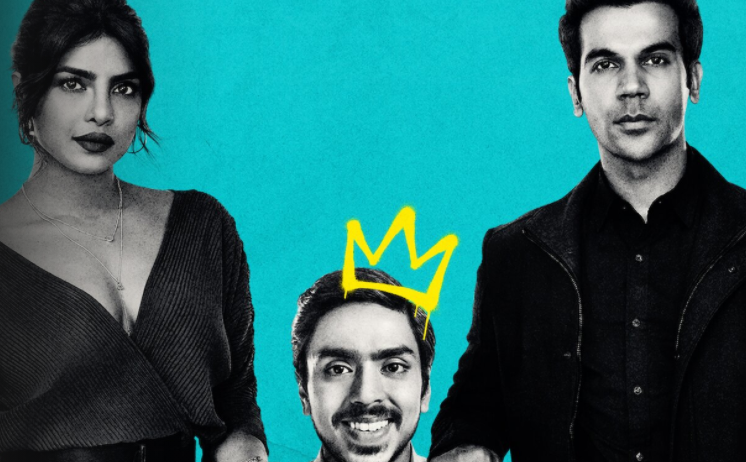‘The White Tiger’ offers chilling insight into modern Indian society from perspective of one of its victims
Based on the New York Times bestselling book by Aravind Adiga, “The White Tiger” examines contemporary Indian society and the toxic culture of corruption and violence ingrained in it.
The film begins with Balram Halwai (Adarsh Gourav), an entrepreneur, writing an email to the Chinese Prime Minister in anticipation of his arrival in India to request a meeting to discuss business. As he writes, Balram smiles, seemingly very confident — almost too confident –in his chances of landing such a meeting. Perhaps acknowledging the scepticism of both the Prime Minister and the audience, Balram begins to recount his life story in this one email, claiming that it is unique because he is, “the creature that gets born only once every generation: the white tiger.”
From this point on, the entirety of the film is a flashback, featuring Balram as the narrator of his own story. As he narrates, Balram addresses the Chinese Prime Minister directly from time to time, reminding the audience that Balram is incorporating everything they are watching into just one email to a character fairly insignificant to the movie as a whole.
Balram’s description of himself as The White Tiger is just one of several instances in which animals are used symbolically to represent a person’s nature. Balram is hired by a man only ever referred to as The Stork. Another member of the family is named The Mongoose. Balram once compares The Stork’s son Ashok to a lamb.
These animal monikers create a sense of mystery surrounding this family; what did The Stork and The Mongoose do to be named after those animals? Perhaps more importantly, who named them that? We hear this story exclusively from Balram’s perspective — could it be that only he thinks of them in that way? None of these questions is asked explicitly in the movie, but thinking about perspective is key, and this movie certainly has a biased narrator.
One of the film’s greatest strengths is its ability to create an interesting, well-developed protagonist. As an audience, we are meant to sympathize with Balram. As he tells us, his desire to be a servant was “hammered into [his] skull” from the moment he was born. He likens his class of people to chickens in a coop: over the years, as more and more chickens are slaughtered, the remaining chickens learn not to resist what they know is their fate. This is an exceptionally disturbing outlook, but it is unfortunately accurate.
We see repeatedly throughout the film how inhumanely Balram is treated by The Stork and his family. Most of the family does not even view Balram as a person, and even Ashok and his Indian-American wife Pinky, who treat Balram with more respect, still view him as someone who will do whatever they ask of him. Since we recognize that there is no good way for Balram to escape this vicious cycle, we can understand why he takes the actions he does in the latter half of the movie.
But this understanding only goes so far. Balram is ambitious above all else, and throughout the movie, he takes advantage of others just as they had taken advantage of him, using ruthless tactics in unapologetic pursuit of his goals. For example, when he is hired by The Stork’s family as their servant and secondary driver, he snoops around and finds out that the family’s primary driver is secretly Muslim and has been hiding it from the Hindu family throughout his 20-year tenure, even going so far as to pray to Hindu gods to avoid suspicion. Despite pleas from the primary driver that this is the only way he knows how to make a living and that he has a family to support, Balram coldly responds, “Don’t we all,” and proceeds to expose the man’s true religion to the family, getting the man fired and making Balram the new primary driver.
This moral ambiguity, combined with the film’s willingness to portray intense scenes in graphic detail, is exactly what makes the film so gripping. We are drawn to Balram’s story not just because it is one of tragedy to success — we know that he becomes a success right from the start — but because of how he gets there; we realize that he is not entirely a product of the situation he is placed in nor the decisions he makes and the actions he takes as a result, but some of both. Because of this, it is up to the audience to judge whether they can respect Balram for his ability to make the best out of a bad situation in spite of what he did to do so. I cannot and will not make that determination for you.
The film also sheds light on the corruption that runs rampant through Indian politics. On more than one occasion, Balram overhears members of The Stork’s family discussing bribes that they have paid to The Great Socialist, the Indian leader who just won re-election, in order to keep themselves and other rich families in power. In one scene, a member of The Great Socialist’s campaign even enters the car while Balram is driving and demands more money from The Stork. The fact that these bribes are so blatantly and openly being negotiated is alarming to me, as someone who knows nothing about Indian politics.
I would recommend “The White Tiger” to anyone who enjoyed the book, but reading the book is not a prerequisite for watching this film.
Grade: A-
Vikram Jallepalli is a senior at Pelham Memorial High School. Writing for the Examiner is his first role in journalism. He performs in Sock’n’Buskin...













